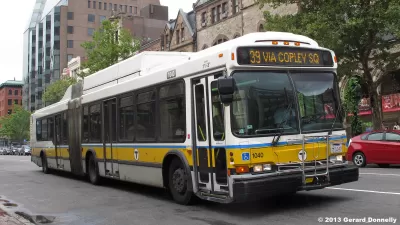Reviewing changes in bulk will make it easier for the Municipal Transportation Agency to remove parking around bus stops in San Francisco.

“San Francisco will kick off 2023 by removing hundreds of parking spaces across the city that obstruct riders from boarding [Municipal Transportation Agency (Muni)] buses — a process that is planned for completion within 18 months,” reports Ricardo Cano for the San Francisco Chronicle.
The changes are required by an ordinance approved by the San Francisco Board of Supervisors, intended to improve the safety and speed of bus boarding around the city. In October, Muni officials estimated that bringing bus stops into conformity with the new regulations would take seven years to complete.
“The reason for the initial, years-long timeline had to do with the bureaucratic process that requires the agency to hold a public hearing for each flag stop where parking will be removed,” explains Cano. The timeline has been shortened dramatically because “the transportation agency has committed to analyzing affected stops ‘in much bigger batches’ as opposed to one-by-one.”
In further evidence of the complicated politics of planning in San Francisco, the ordinance that is paving way for improved bus boarding was proposed by Supervisor Dean Preston, a familiar and favorite target of YIMBY advocates in the city and region.
FULL STORY: S.F. will remove parking spaces obstructing Muni bus stops sooner than expected. Here’s when it will start

Study: Maui’s Plan to Convert Vacation Rentals to Long-Term Housing Could Cause Nearly $1 Billion Economic Loss
The plan would reduce visitor accommodation by 25,% resulting in 1,900 jobs lost.

North Texas Transit Leaders Tout Benefits of TOD for Growing Region
At a summit focused on transit-oriented development, policymakers discussed how North Texas’ expanded light rail system can serve as a tool for economic growth.

Why Should We Subsidize Public Transportation?
Many public transit agencies face financial stress due to rising costs, declining fare revenue, and declining subsidies. Transit advocates must provide a strong business case for increasing public transit funding.

How to Make US Trains Faster
Changes to boarding platforms and a switch to electric trains could improve U.S. passenger rail service without the added cost of high-speed rail.

Columbia’s Revitalized ‘Loop’ Is a Hub for Local Entrepreneurs
A focus on small businesses is helping a commercial corridor in Columbia, Missouri thrive.

Invasive Insect Threatens Minnesota’s Ash Forests
The Emerald Ash Borer is a rapidly spreading invasive pest threatening Minnesota’s ash trees, and homeowners are encouraged to plant diverse replacement species, avoid moving ash firewood, and monitor for signs of infestation.
Urban Design for Planners 1: Software Tools
This six-course series explores essential urban design concepts using open source software and equips planners with the tools they need to participate fully in the urban design process.
Planning for Universal Design
Learn the tools for implementing Universal Design in planning regulations.
Ascent Environmental
Borough of Carlisle
Institute for Housing and Urban Development Studies (IHS)
City of Grandview
Harvard GSD Executive Education
Toledo-Lucas County Plan Commissions
Salt Lake City
NYU Wagner Graduate School of Public Service





























